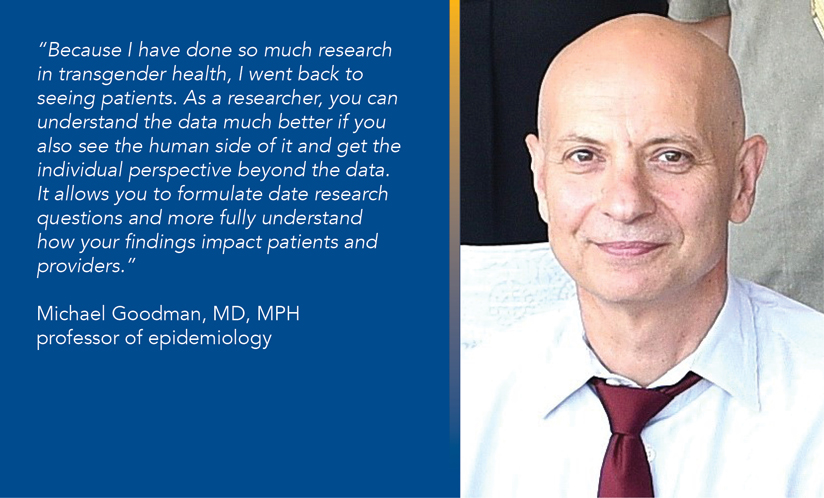Researcher Profile: Michael Goodman

By Karina Antenucci
Though his extensive resume, accolades, and 300 peer-reviewed publications tell the story of a prolific career, Michael Goodman, MD, MPH, professor of epidemiology, says he rarely has had a master plan for its trajectory.
“One thing leads to another,” says Goodman, who is trained and board-certified in both pediatrics and preventive medicine, of his career path and varied research interests.
As a researcher, he has concentrated on cancer epidemiology, global epidemiology of non-communicable diseases, and children’s health. Ten years ago, his interest in prostate cancer health and survival led him to transgender research, which is now a major focus that continues to expand into many health topics relevant to trans people.
Improving Transgender Health Through Research and Practice
For instance, the Study of Transition, Outcomes and Gender (STRONG) was initiated to assess the health status of transgender people in general and following gender-affirming treatments at Kaiser Permanente health plans in Georgia, Northern California, and Southern California. Plans for this ongoing study include filling existing knowledge gaps in incidences of cardiovascular disease, mental health, HIV, and diabetes through comparisons of transgender and reference populations.
Some of Goodman’s recent research findings have included that female hormones may be associated with increased risk of blood clots and stroke (but not heart attack) in trans women and that there are benefits of gender-affirming treatments as they relate to depression, anxiety, and the quality of life for trans people.
“Physicians have to be diligent and careful when they see people who present as trans. Mental health is almost an emergency for many who come to them with personal histories of discrimination,” Goodman says.
Goodman’s work with transgender people is what guided him back to the clinical side of things. He now sees youths and young adults at Grady Medical Center.
“Because I have done so much research in transgender health, I went back to seeing patients. As a researcher, you can understand the data much better if you also see the human side of it and get the individual perspective beyond the data. It allows you to formulate date research questions and more fully understand how your findings impact patients and providers,” he says.
Though optimistic that there will be a day when the “dust will settle,” Goodman is still concerned about the recent politicization of transgender medicine. “It is alarming because it prevents us from doing our work properly, collecting data and providing guidelines. It is true that we have a lot of unanswered questions. But the way you resolve controversy is through research and generating as much data as possible, not by banning things,” he says.
Another area of gender-minority research that Goodman is highly interested in is people born with intersex conditions, often referred to as disorders (or differences) of sex development. In an ongoing study with partner Kaiser Permanente, he is analyzing data on mental health status, growth trajectories, and other health indicators among kids and adults with various intersex conditions.
Finding Community at Emory and Atlanta
Originally from Lithuania, Goodman moved to Atlanta in 2003 and has been a professor at Emory University for 20 years. His current teaching assignments include graduate seminars on systematic reviews and meta-analyses and teaching epidemiology (“teaching to teach,” as he calls it). In addition, he is co-director of the dual degree MD/MPH program, offered jointly by Emory School of Medicine and Rollins, where students spend a year in public health in between medical training.
“My wife and I moved here on our 20th wedding anniversary. We counted that we lived in 20 places in the first 20 years of our marriage. Since then, we’ve stayed put in Atlanta and at Emory, which is telling of how much we like it here,” says Goodman.
He adds, “At Emory, you get the feel of a family environment, though it is a large university. In Atlanta, you get the feel of a small town, though you’re in a major metropolitan area. They are both wonderful.”


